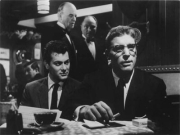Is It Really a Great Movie? Part Nine: Sweet Smell of Success
by dan heaton
Using Roger Ebert's Great Movies book as a guide, this series of articles will focus on all films included on his list that previously have escaped my notice. Since all lists are subjective, I am not treating Ebert's choices as the essential selection of films. However, his essays offer the perfect chance for me to explore both classics and lesser-known pictures from around the globe.

Sweet Smell of Success opened in 1957 and garnered considerable acclaim for its biting look at the dark side of the newspaper world. However, it received zero Academy Award nominations and is often forgotten by film experts. Along with Roger Ebert’s regard, the film did appear on Time Magazine’s recent list of the best All-Time 100 Movies. Tony Curtis also earned a Best Foreign Actor from the British Academy of Film and Television Arts (BAFTA) in 1958. Director Alexander Mackendrick is better known for directing the early ‘50s British comedies The Ladykillers and The Man in the White Suit. In his first Hollywood picture, Mackendrick delivers an intriguing, nasty picture that should offer a major surprise to modern viewers.
“My right hand hasn't seen my left hand in thirty years.” - J.J. Hunsecker
The story focuses on two newspaper men who differ considerably from the morally driven reporters often depicted in Hollywood. Burt Lancaster’s J.J. Hunsecker rules the printed page with a column that reaches 60 million readers. Firmly entrenched at a high-end club with a phone at his table, Hunsecker bluntly dismisses anyone who cannot directly serve his goals. Apparently less harmful is the press agent Sidney Falco (Tony Curtis), who struggles to escape J.J’s wrath. The film begins with Sidney and sets up his character as the hero, but we quickly discover his self-serving interests. The first act covers one night and uses a relentless pace that reveals their frenetic world. J.J. has tasked Sidney to break up the budding romance between his sister Susan (Susan Harrison) and jazz guitarist Steve Dallas (Marty Millner). Sidney’s failure to end their relationship has serious consequences and could jeopardize his career.
One of my key reasons for choosing this project was the chance for me to hopefully break any stigmas about exploring older films. While I’ve never had a problem watching classics like Casablanca or Stagecoach, would I be willing to go deeper into cinema history? Sweet Smell of Success offers a perfect example of a gem that I would not have picked without his series. The dialogue may have been written 50 years ago, but it remains as sharp as the best releases available today. Writers Ernest Lehman and Clifford Odets included almost zero sentimentality in the script, which helps it to avoid being dated. Millner’s chivalrous Steve Dallas is a good guy, and it gives him little chance against J.J and Sidney’s vicious actions. He also feels very dull, which makes it almost impossible to root for his relationship with Susan. The black-and-white cinematography also works beautifully to depict the dark city. Too much color would have introduced hope into a bleak world that mostly deals misery to everyone.
During Sidney’s early struggles to reach J.J., we’re aligned with his goal to regain his status with the columnist. However, the story’s progression reveals his brutal tactics and lowers his appeal considerably. Their first scene together is classic and reveals both character’s essential goals. J.J. aims to prove his dominance to everyone and enjoys coldly dismissing anyone who cannot assist him right now. His one soft spot is the possibly incestuous thoughts about his sister, but he even tries to control her life. On the opposite end, Sidney wants to reach J.J.’s perch and attempts to charm anyone to attain this status. Steve and Susan are innocent pawns needed to increase his place, and while Sidney might not enjoy harming them, they are necessary casualties. Both men exert their power in completely different ways, and neither will take defeat without a serious battle.
Roger Ebert describes Sweet Smell of Success as “sharp-edged” and “merciless,” and both terms accurately summarize the picture. While these qualities might be flaws to a lesser film, they succeed completely and generate a compelling film. Tony Curtis and Burt Lancaster chew up the screen with their nasty moves and deliver highly memorable performances. I’ve never considered Curtis a great actor, but his work here is remarkable and even outdoes his effective co-star. The story’s only failing is the simplistic plot, which never moves beyond shifty moves aimed at destroying a legitimate relationship. The finale is pretty much a downer, but the concluding scenes match the overall tone. If Mackendrick had chosen a more uplifting end, it would have undermined the characters and severely lessened the movie. In terms of its “great movie” status, I would place this film into the second tier of classic films. It deserves more recognition from audiences and is correctly placed onto Ebert’s list.
Copyright (c) 2007 erasing clouds |
|